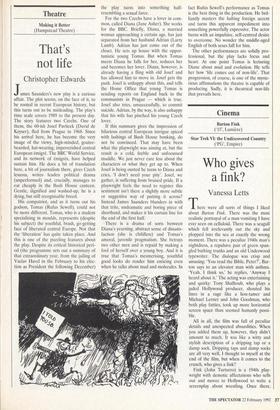Theatre
Making it Better (Hampstead Theatre)
That's not life
Christopher Edwards
J ames Saunders's new play is a curious affair. The plot seems, on the face of it, to be rooted in recent European history, but this turns out to be misleading. The play's time scale covers 1989 to the present day. The story features two Czechs. One of them, the 60-ish Josef Pavlicek (David de Keyser), fled from Prague in 1968. Since his arrival here, he has become the very image of the viewy, high-minded, goatee- bearded, hat-wearing, impoverished central European émigré. The BBC World Service, and its network of émigrés, have helped sustain him. He does a bit of translation here, a bit of journalism there, gives Czech lessons, writes leaden political drama (unperformed) and, crucially, manages to eat cheaply in the Bush House canteen. Gentle, dignified and washed-up, he is a dying, but still recognisable breed.
His compatriot, and as it turns out his godson, Tomas (Rufus Sewell), could not be more different. Tomas, who is a student specialising in moulds, represents (despite his subject) the youthful, brash, go-getting face of liberated central Europe. Not that the 'liberation' has quite taken place. And this is one of the puzzling features about the play. Despite its critical historical peri- od (the programme sets out a summary of that extraordinary year, from the jailing of Vaclav Havel in the February to his elec- tion as President the following December) the play turns into something half- resembling a sexual farce.
For the two Czechs have a lover in com- mon, called Diana (Jane Asher). She works for the BBC. Briefly, Diana, a married woman approaching a certain age, has just separated from her husband Adrian (Larry Lamb). Adrian has just come out of the closet. He sets up house with the oppor- tunistic young Tomas. But when Tomas meets Diana he falls for her, seduces her and becomes her lover. Diana, however, is already having a fling with old Josef and has allowed him to move in. Josef gets the push. Josef is unhappy about this, and tells the Home Office that young Tomas is sending reports on England back to the communists in Prague — which is true. Josef also tries, unsuccessfully, to commit suicide. Adrian, by the way, is also unhappy that his wife has pinched his young Czech lover.
If this summary gives the impression of hilarious central European intrigue spiced with lashings of Bush House bonking, do not be convinced. That may have been what the playwright was aiming at, but the result is a cold, feeble and unfocussed muddle. We just never care less about the characters or what they get up to. When Josef is being ousted he turns to Diana and cries, 'I don't need your pity'. Josef, we gather, is suffering from bruised pride. If a playwright feels the need to register this sentiment isn't there a slightly more subtle or suggestive way of putting it across? Instead James Saunders blunders in with that trite, undramatic and boring piece of shorthand, and makes it his curtain line for the end of the first half.
There is a drama of sorts between Diana's yearning, abstract sense of dissatis- faction (she is childless) and Tomas's amoral, juvenile pragmatism. She betrays two other men and is repaid by making a fool of herself over a young boy. And it is true that Tomas's mesmerising, youthful good. looks do render him enticing even when he talks about mud and molecules. In fact Rufus Sewell's performance as Tomas is the best thing in the production. He bril- liantly masters the halting foreign accent and turns this apparent impediment into something powerfully expressive. The actor burns with an impulsive, self-centred desire to overcome. No wonder the middle-aged English of both sexes fall for him.
The other performances are solidly pro- fessional, but the play lacks focus and heart. At one point Tomas is lecturing Diane about mud and evolution. He tells her how 'life comes out of non-life'. That progression, of course, is one of the myste- rious affirmations the theatre is capable of producing. Sadly, it is theatrical non-life that prevails here.


















































 Previous page
Previous page